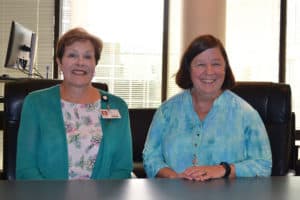BioVentures, Boot Camp Garner National Award, Recognition
| In less than three years, the Health Sciences Entrepreneurship Boot Camp has gone from pilot project to national award winner, recently earning a second place Innovations in Research and Research Education Award from the Association of American Medical Colleges.
“Being able to claim the Boot Camp has won an award like this means it’s had outside review and analysis and deemed worthy of an award,” said Nancy Gray, Ph.D., director of BioVentures. “I am tremendously excited by this award because it validates the effectiveness of the Boot Camp and deems it an innovative approach. Promoting that award we can garner more buy-in to support it. The more support we have the more sustainable it is.”
The Boot Camp is a joint initiative of UAMS, Arkansas INBRE, BioVentures and The Conductor, a public-private partnership with the University of Central Arkansas (UCA) in Conway and Startup Junkie. Arkansas INBRE (IDeA Networks of Biomedical Research Excellence) helps build research infrastructure across the state.

Nancy Rusch, left, first had the idea for the boot camp. Nancy Gray and Rusch then worked together to develop it into the prize-winning program it is today.
The curriculum is designed to give Boot Camp students the knowledge and tools they need to think critically, learn entrepreneurial principles and launch innovative ventures. Additionally, the camp offers leadership, team building and other recreational experiences.
The first class at UAMS was made up of graduate students and post-doctoral researchers. Two of the students started their own companies. Last year, the boot camp had 18 undergraduate students from 10 schools. Two teams went on to compete in the 2017 Donald W. Reynolds Governor’s Cup collegiate business plan competition and one won the $25,000 top prize.
Gray said it was Nancy Rusch, Ph.D., who came up with the idea of the boot camp more than two years ago. Rusch chairs the College of Medicine Department of Pharmacology and Toxicology and leads the educational efforts of the UAMS Translational Research Institute (TRI). Her idea was sparked by what she observed from the students at UAMS.
“Our students and postdoctoral fellows in research have a growing interest in translating their discoveries into new medications, diagnostics and devices for clinical use,” Rusch said. “There is a big gap in expertise, however, from making a discovery in the laboratory and leveraging that discovery into a commercial product that can improve health outcomes.”
Together, Rusch and Gray developed the curriculum for a week-long boot camp for UAMS graduate students in 2016. They were awarded a supplemental grant to a NIH-funded T32 training grant in pharmacology and toxicology led by Philip Mayeux, Ph.D. Using these funds and support from the TRI, they launched the first boot camp.
“The original boot camp for Ph.D. and M.D./Ph.D. students was designed to give our trainees a crash course on business principles and the customer discovery process to determine whether a discovery may actually have market value,” Rusch said. “The National Institutes of Health also has taken a major interest in equipping trainees with entrepreneurial skills
At the suggestion of Lawrence Cornett, Ph.D., and with support from the INBRE program he leads, theBoot Camp in 2017 was turned into a residential program on the campus of UCA for undergraduates and recent graduates from as many as 15 Arkansas universities and colleges.
In May, 17 students graduated from the Boot Camp, bringing the total number of students who have gone through it to 51.
Gray said although there are quite a few entrepreneurship boot camps, having one focused on health sciences is unique. The program also has drawn students from diverse backgrounds, more than half have been women, 25 percent African-American, 10 percent Hispanic and 8 percent Asian.
Operating the Boot Camp as an on-campus residential program for the students also has made a big difference, Gray said. It allows the students to bond and to work together in the evenings to come up with business proposals and perfect their presentations. Each boot camp concludes with student teams presenting their ideas and business proposals to an audience of instructors, mentors and a judge’s panel that picks a winner .
Another contributor to the Boot Camp’s success has been the support the program has received from UCA, Conway Regional Medical Center, and the Arkansas business community.
“A key change was having a strong partnership with Conway Regional who opened their doors to the students when they went out to do their customer discovery,” Gray said. “We also recruited a number of mentors from the business community that worked with each team during the ideation and vetting process. With these changes, we saw a big difference between the two groups in the ideas that were vetted and in the final presentations. At the end of the 2018 Boot Camp, we estimated that nearly 70 people had donated their time to enrich the experience of the students during the week-long process.”
Based on feedback from the students, Gray said she and the other partners in the Boot Camp will continue to adjust and perfect the program. Adding more team-building elements is one likely change. For everyone behind the Boot Camp, national recognition doesn’t mean they’re done. It means more work along a path that already has proven its success.
